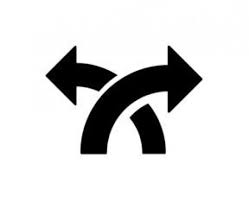|
(2016
midterm assignment) Model Student Midterm answers 2016 (Index) Essay 2: Personal / professional topic |
 |
Marion Johnson
The Rise of A.I.
The research and development into Artificial Intelligence has been
exponentially increasing over the past several decades. As new technology
continues to emerge, many are left questioning what moral and social
consequences of artificial intelligence need to be addressed. In traditional
science fiction, artificial intelligence can be seen as an extension of
humanity’s intelligence. The question for scientists becomes: when does that
intelligence extend too far? The answer can vary widely, and is still a topic
for debate. In addition to raising these questions, science fiction narratives
typically illustrate the ways in which artificial intelligence can lead to a
utopia or a dystopia. Narratives that focus on artificial intelligence can
provide realistic moral considerations for readers, while additionally
illustrating potential futures for humanity and robotics. The narratives are
worth examining, with both the utopia and dystopia outcomes considered.
Before the rapid development of artificial intelligence, authors of
science fiction typically focused on humanity’s evolution in a strictly
biological sense. In H.G. Well’s “The Time Machine”, it’s stated that “With this
change in condition comes inevitably adaptations to the change. What, unless
biological science is a mass of errors, is the cause of human intelligence and
vigour? Hardship and freedom: conditions that put a premium upon the loyal
alliance of capable men” (Wells 50). Humanity and its struggles are the primary
source for evolution in this novel, with technology residing solely in the
background. This premise is also seen within Octavia Butler’s “Parable of the
Sower”, in which the narrator states “We adapt and endure, for we are Earthseed,
and God is change” (Butler 20). The novel focuses on humanity and the
character’s unique struggles, and pays no attention to addressing technology or
its potential impact on the future.
The
novel “I, Robot” by Isaac Asimov was unique in that it is widely regarded as one
of the first science fiction novels to address artificial intelligence. The
novel consists of nine different short stories, with robots being portrayed in
both a positive and negative light. The first short story, “Robbie”, describes a
robot who is adored by Gloria and her father, George. When Gloria’s mother
attempts to criticize Robbie, George defends Robbie by stating that “He’s the
best darn robot money can buy and I’m darned sure he set me back half a year’s
income. He’s worth it, though—darn sight cleverer than half my office staff”
(Asimov 10). Gloria’s mother attempts to rid the family of Robbie, but her
daughter’s adoration for the robot finally makes her concede and allow the robot
to stay. In contrast with the uplifting ending of Robbie’s tale is the short
story “Reason”. Within this story, a robot named cutie develops a morality that
doesn’t line up with humanity’s, and can be considered evil. Cutie asserts to
the humans commanding him that “I myself, exist, because I think” (Asimov 30).
This short story raises serious questions regarding the social consequences of
widespread artificial intelligence.
Scholars have attempted to distinguish natural and artificial intelligence, in
order to provide a more thorough analysis of both. In Robert Sokolowski’s essay
“Natural and artificial intelligence”, he states that “Suppose we were to claim
that artificial intelligence is a genuine, though constructed, intelligence.
Must we then prove the truth of that claim? Are we obliged to show that the
machines really think, that they do not only seem to possess intelligence?”
(Sokolowski 46). He goes on to elaborate that “The problem is that thinking is
not as visible and palpable as are illumination, motion, and flight” (Sokolowski
46). These questions are evidently
worth considering, as articles such as “Can This Make AI More Human?” proves.
This MIT article discusses the way in which cognitive scientists are attempting
to link robotics to human behavior. As artificial intelligence continues to
progress, similar questions will undoubtedly arise.
While
the popularity of dystopi- centric novels paints artificial intelligence in a
negative light, the positive outcomes of artificial intelligence have yet to be
as thoroughly explored. Novels such as “I, Robot”, however, give readers
important considerations to ponder as A.I. continues to rise. Whether the public
approves or not, artificial intelligence will likely become prevalent in modern
life. It’s simply a question of when.
Works
Cited
Asimov, Isaac. I, Robot. London: Grafton, 1986. Print.
Butler, Octavia E. Parable of the Sower. Print
Knight, Will. "Can This Man Make AI More Human?" Technology Review. 17 Dec.
2015. Web.
Sokolowski, Robert. “Natural and Artificial Intelligence”. Daedalus 117.1
(1988): 45–64. Web.
 |
 |
 |
